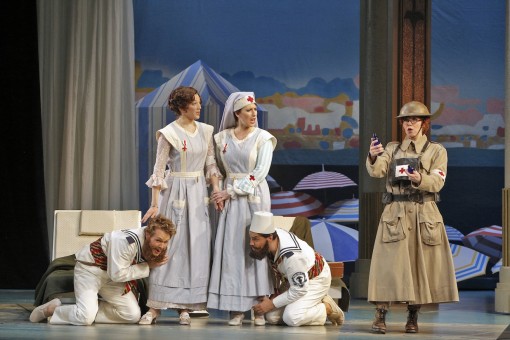SFO “Cosi” looks great, yet proves vocally less filling

From left, Philippe Sly, Christel Lötzsch, Ellie Dehn, Francesco Demuro, and Susannah Biller in Mozart’s “Cosi fan tutte” at San Francisco Opera. Photo: Cory Weaver
Of the three operas Mozart collaborated on with Lorenzo da Ponte, Cosi fan tutte is the least often performed today. The reasons have nothing to do with the music, which is the equal of the other two works in inspiration and, arguably, the greatest of the three in variety with more duets and trios than in Le nozze di Figaro and Don Giovanni.
Rather, the sardonic storyline is difficult to pull off in our more enlightened times. Two young men, Ferrando and Guglielmo, engage in a bet with the cynical old bachelor Don Alfonso that their fiancées, the sisters Fiordiligi and Dorabella, will be eternally faithful. The men pretend to go off to war only to return in disguise to woo each other’s lovers. Unfortunately, they do their job too well, and the sisters fall in love with each other’s intended, to the men’s consternation and Alfonso’s great amusement. Ultimately all is resolved sort of happily, though the abrupt and unconvincing coda has proven notoriously problematic for directors to pull off successfully.
Despite the rather cruel foundation of the mate-swapping scenario—Beethoven considered the opera “immoral”—there is great humanity and emotional depth in Cosi, as well as some of Mozart’s finest music set amid a broad comedy and farce that feels remarkably modern.
San Francisco Opera has revived its popular 2005 production, seen Friday night at the War Memorial Opera House. And while the clever staging and good-looking young cast provided ample pretty pictures and delivered the comedy in admirable fashion, the singing was less consistent, at times jarringly so.
The production, which originated with John Cox, updates the action to Monte Carlo, circa, 1914. Robert Perdziola’s design is consistently eye-catching with bright-hued sets capturing the wealthy seaside milieu, and glamorous gowns for the women. Less successful was the surrounding wartime tableau with the sisters later costumed as military hospital nurses, which felt anachronistic and confusingly muddied the waters of the men’s mock poisoning and Despina’s doctor masquerade.
The male principals proved a much more vocally impressive lot and better Mozart stylists than the women. Marco Vinco, in particular, was a Don Alfonso for the ages. Younger than most in this role, and looking elegant in his period tuxedos, the Italian bass wholly inhabited the role of the devious trickster. A suave and graceful presence on stage, he sang with a deep burnished tone and fluent ease.
Though he stood about a foot shorter than his Dorabella, Francesco Demuro displayed a big, vibrant Italian tenor as Ferrando, and delivered a lovely Un’ aura amorosa—one pitchy note apart—and vehement Tradito, schernito.
As Guglielmo, Philippe Sly, a first-year Adler fellow, possesses a somewhat burly bass-baritone for this role yet was consistently alive to the quicksilver comedy and sang well, enough to make one regret his not getting to sing Rivolgete a lui lo sguardo.
The trio Soave sia il vento was beautifully rendered but otherwise the vocalism from the women was variable at best.
Ellie Dehn was a worthy Countess in San Francisco Opera’s Le nozze di Figaro three years ago, but sounded like a completely different singer in the role of Fiordiligi. The soprano’s lower register seemed to disappear, and her tone was shallow and colorless, starkly lacking the requisite agility. She was painfully out of her depth in the role’s coloratura flights, as with a strained Come scoglio and starkly so in Per pieta, unaided by Nicola Luisotti’s slow tempos. Can’t a company of this stature find better Mozart singers than this?
As Dorabella, Christel Lötzsch looked great in lingerie, but the willowy German mezzo proved uneven in her U.S. debut, with a throaty tone and singing that was short-breathed and fitfully under pitch, her diction often impenetrable.
One could have forgiven Susannah Biller’s nonstop mugging and preciousness as Despina—a showy comic role where that line is often crossed—had she delivered better singing than the shrill, wiry vocalism heard Friday night.
This production’s attempt to solve the problematic coda was about as successful as most, which is to say not. Having the men decide to enlist in the army for real and leave the women distraught felt forced and hollow. Otherwise, Jose Maria Condemi directed in a lively yet sensitive style, giving the serious moments space to resonate.
Like the singing, Nicola Luisotti’s conducting was a mixed blessing. While the SFO music director gave the lyrical moments their due, his extreme tempo fluctuations weren’t always convincing, especially slowing Per pieta down to a crawl that nearly came to a dead stop. The San Francisco Opera Orchestra has more scrappy moments than one expects from these excellent musicians with bland winds in the overture, blaring horns and a trumpet that at one point ran a beat ahead of the ensemble.
Cosi fan tutte runs through July 1. sfopera.com; 415-864-3330.